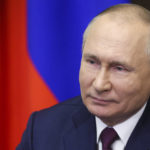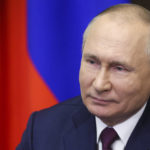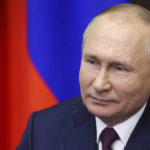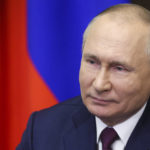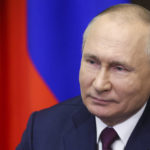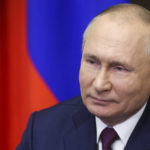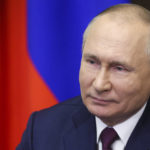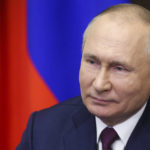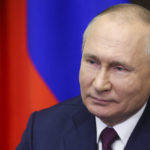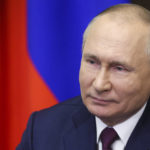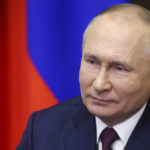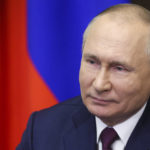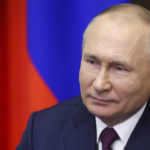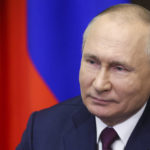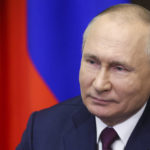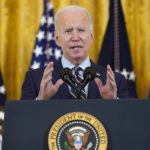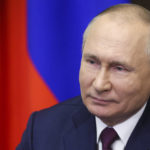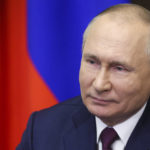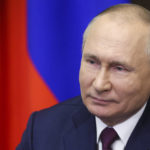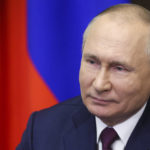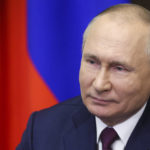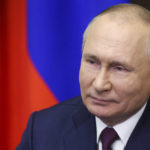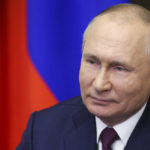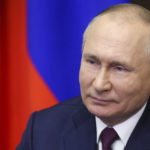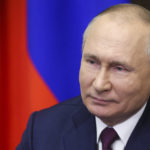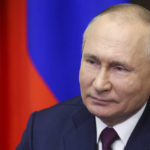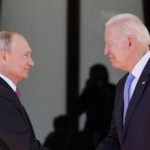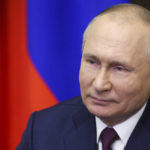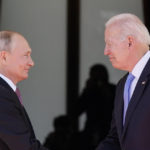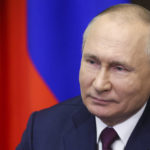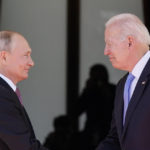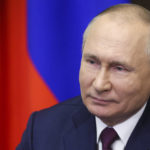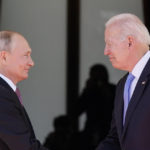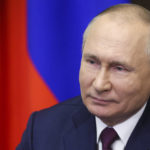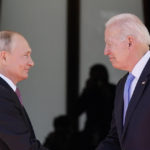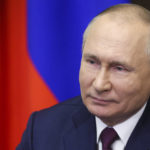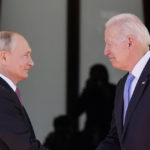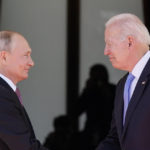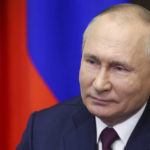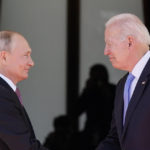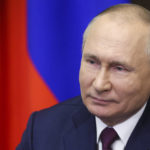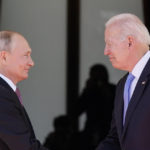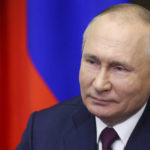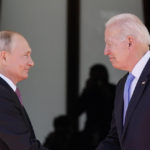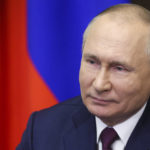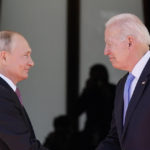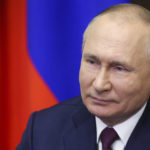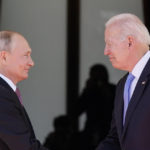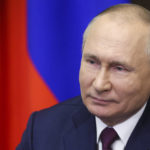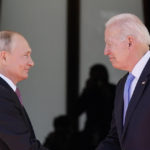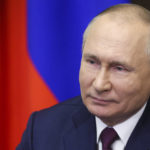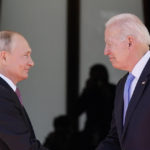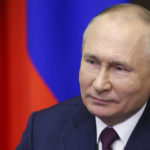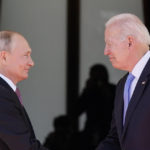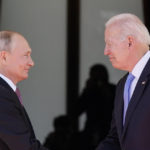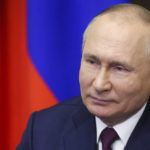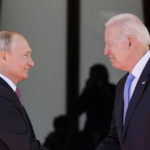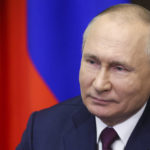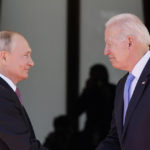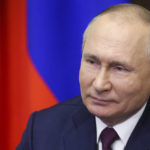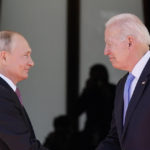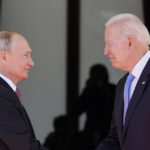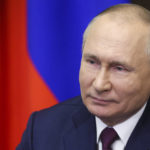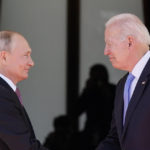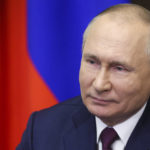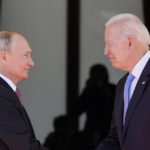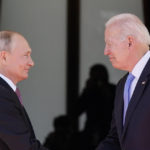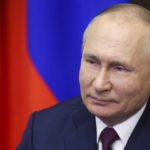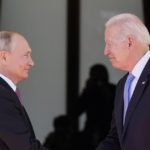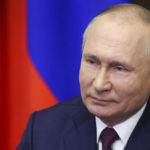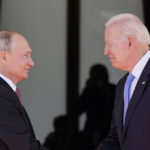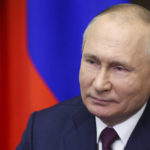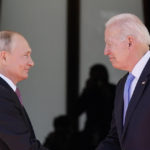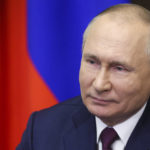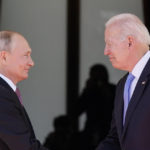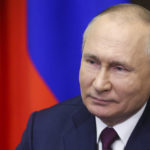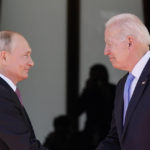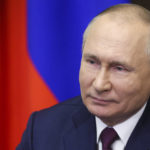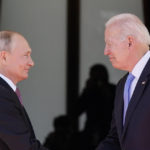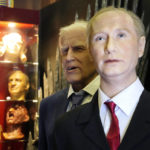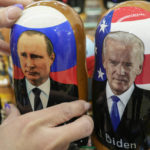Biden-Putin talks on Ukraine crisis rooted in older dispute
Dec 5, 2021, 8:17 PM | Updated: Dec 7, 2021, 5:46 pm

Russian President Vladimir Putin talks with Francesco Rocca, the president of the International Federation of Red Cross and Red Crescent Societies during a video call in Moscow, Russia, Sunday, Dec. 5, 2021. Putin has voiced hope for a quick approval of the country's Sputnik V coronavirus vaccine by the World Health Organization, saying the move is essential for expanding its global supplies. (Mikhail Metzel, Sputnik, Kremlin Pool Photo via AP)
(Mikhail Metzel, Sputnik, Kremlin Pool Photo via AP)
WASHINGTON (AP) — The Cold War ended 30 years ago this month, but one unresolved issue — how closely Ukraine, a former Soviet republic, can ally with the West — is now creating some of the deepest U.S.-Russian tensions in years.
The dispute over Ukraine’s status and its growing alignment with U.S.-led NATO will be at the center of President Vladimir Putin’s video meeting Tuesday with President Joe Biden, whose administration says an extensive Russian military buildup near Ukraine points to a potential invasion.
Russia denies any intention of invading and says Washington and Kyiv are the ones stirring up trouble.
Putin has his own demands: A binding assurance that Ukraine will not join NATO and that the Western alliance will not add forces in states near Russia.
“I want to make it crystal clear: Turning our neighbors into a bridgehead for confrontation with Russia, the deployment of NATO forces in the regions strategically important for our security, is categorically unacceptable,” Russian foreign minister Sergei Lavrov said last week, echoing Putin.
That demand is a non-starter for Biden.
A key principle of the NATO alliance is that membership is open to any qualifying country. And no outsider has membership veto power. While there’s little prospect that Ukraine would be invited into the alliance anytime soon, the U.S. and its allies won’t rule it out.
“NATO member countries decide who is a member of NATO, not Russia. And that is how the process has always been and how it will proceed,” White House press secretary Jen Psaki said Friday.
Ahead of his Putin meeting, Biden conferred by phone Monday with the leaders of France, Germany, Britain and Italy. They discussed a “shared concern about the Russian military buildup on Ukraine’s borders and Russia’s increasingly harsh rhetoric,” according to a White House statement. They agreed to continue pursuing diplomacy, including through the so-called Normandy Format that brings together Ukraine, Russia, Germany and France in search of a political solution, so far to no avail.
Ukrainian President Volodymyr Zelenskyy wrote on Twitter that he had coordinated positions with U.S. Secretary of State Antony Blinken. “Agreed to continue joint & concerted action,” Zelenskyy wrote, saying he was grateful for the “continued support of our sovereignty & territorial integrity.”
Blinken last week said the U.S. would work with allies to impose “severe costs and consequences” on Russia if it attacks.
On Friday Biden said he has developed, with allies, the “most comprehensive and meaningful set of initiatives to make it very, very difficult for Mr. Putin” to invade. That likely would be significant U.S. and allied economic and financial sanctions against Moscow. The administration also has been considering providing additional defensive weaponry to Ukraine, though Biden has given no indication he would respond to an incursion with direct U.S. military force.
Putin’s grievances with the West are longstanding and go beyond the Ukraine question. They date to the early post-Cold War years when Russia felt humiliated by the collapse of its economy and its loss of global clout. After Washington began a global war on terrorism, Putin lashed out at what he saw as American arrogance.
“One state and, of course, first and foremost the United States, has overstepped its national borders in every way,” he asserted at an international conference in Munich in 2007. “This is visible in the economic, political, cultural and educational policies it imposes on other nations. Well, who likes this?”
Russia has since rebuilt its military and become more assertive in the Middle East and in Ukraine.
The history of Ukraine’s relations with Russia and the West is complex. After the breakup of the Soviet Union in December 1991, Ukraine agreed to give up the nuclear missiles that Moscow had deployed on its territory during the Cold War. It did so in line with the 1994 Budapest Memorandum, in which Russia and the West agreed to respect the “independence and sovereignty and the existing borders of Ukraine.”
Ukraine began establishing closer ties to NATO. It has never been explicitly promised membership, although in April 2008 NATO formally declared that Ukraine and Georgia “will become” members in the future. That future has not yet arrived.
Four months after the 2008 NATO declaration, Russia invaded Georgia. In 2014, Russia annexed Ukraine’s Crimean peninsula and weeks later it threw its weight behind a separatist insurgency in Ukraine’s eastern Donbas region. A 2015 peace agreement brokered by France and Germany helped end large-scale battles in Donbas, but efforts to reach a political settlement have failed and sporadic skirmishes have continued along the tense line of contact. Russia has refused recent overtures for talks with France and Germany.
Ukraine has deep historical and cultural ties to Russia, and Putin has repeatedly asserted that Russians and Ukrainians are “one people.” He has said that large chunks of Ukrainian territory are historic parts of Russia that were arbitrarily granted to Ukraine by Communist leaders under the Soviet Union.
Because Ukraine is not a NATO member, the United States has no treaty obligation to defend it.
The eastward expansion of NATO has from the start been a bone of contention not just with Moscow but also in Washington. In 1996, when President Bill Clinton’s national security team debated the timing of membership invitations to former Soviet allies Poland, Hungary and the Czech Republic, his defense secretary, William J. Perry, advised that it be delayed in order to keep Russian relations on track. Perry wrote in his memoir that when he lost the internal debate he considered resigning.
Poland, Hungary and the Czech Republic were formally invited in 1997 and joined in 1999. They were followed in 2004 by Bulgaria, Romania, Slovakia, Slovenia and the former Soviet states of Estonia, Latvia and Lithuania. Since then, Albania, Croatia, Montenegro and North Macedonia have joined, bringing NATO’s total to 30 nations.
Putin has now drawn the line at Ukraine, whose leader is promising a tough response to any test. Zelenskyy, the Ukrainian president, said his country’s military is a “highly capable and highly organized force that is confident in its potential and is able to derail any expansionist plans by the enemy.”
___
AP writers Aamer Madhani and Sagar Meghani in Washington and Daria Litvinova in Moscow contributed to this report.
Copyright © The Associated Press. All rights reserved. This material may not be published, broadcast, rewritten or redistributed.

